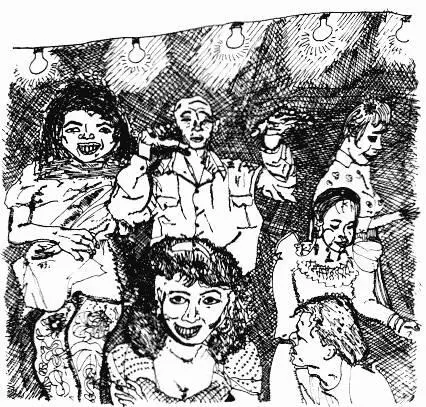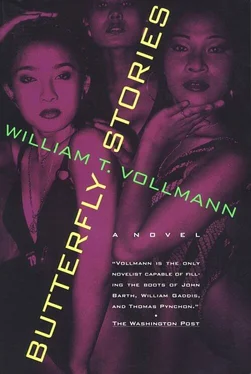William Vollmann - Butterfly Stories
Здесь есть возможность читать онлайн «William Vollmann - Butterfly Stories» весь текст электронной книги совершенно бесплатно (целиком полную версию без сокращений). В некоторых случаях можно слушать аудио, скачать через торрент в формате fb2 и присутствует краткое содержание. Год выпуска: 1994, ISBN: 1994, Издательство: Grove Press, Жанр: Современная проза, на английском языке. Описание произведения, (предисловие) а так же отзывы посетителей доступны на портале библиотеки ЛибКат.
- Название:Butterfly Stories
- Автор:
- Издательство:Grove Press
- Жанр:
- Год:1994
- ISBN:9780802134004
- Рейтинг книги:5 / 5. Голосов: 1
-
Избранное:Добавить в избранное
- Отзывы:
-
Ваша оценка:
- 100
- 1
- 2
- 3
- 4
- 5
Butterfly Stories: краткое содержание, описание и аннотация
Предлагаем к чтению аннотацию, описание, краткое содержание или предисловие (зависит от того, что написал сам автор книги «Butterfly Stories»). Если вы не нашли необходимую информацию о книге — напишите в комментариях, мы постараемся отыскать её.
Butterfly Stories — читать онлайн бесплатно полную книгу (весь текст) целиком
Ниже представлен текст книги, разбитый по страницам. Система сохранения места последней прочитанной страницы, позволяет с удобством читать онлайн бесплатно книгу «Butterfly Stories», без необходимости каждый раз заново искать на чём Вы остановились. Поставьте закладку, и сможете в любой момент перейти на страницу, на которой закончили чтение.
Интервал:
Закладка:
Esther said: But you've got to stop fucking around!
and he hung his head and said: I can't help it.
and she said: You don't mean that you have AIDS?
and he said: I don't think so, but I'll probably keep on until I get it.

The cool white girl's body had turned away from him, sleeping in his hotel bed, shoulders drawn up like frail bony wings, swellings of breath at her delicious salty armpits (her neck and face smelled like soap) — the Virgin sleeping, too, on a leather thong around her neck (the white girl had said that whenever she fucked, the Virgin turned her back, huddling sadly into the medallion), dark hair on the pillow, thick dark hair between her legs, richer and fleecier and more odorous than the Asian girls'. Something about the way her eyes were closed made the vision-crevices wider and more massive, the darkness within glistening like her eyeball. She'd only let him do her once. But all night she stroked him tenderly. He hugged her, kissed the needlemarks on her veins. In the morning she jerked him off. He lay secure and triumphant against her with the wordless animal happiness which defeated past and future, a new lover to his credit; an hour after he'd left her, he called her on the phone and she said to him: sweetheart.
Instantaneously the disease of love broke out again with all its hideous purpuric spots.
He tried to remember everything about her, everything she'd said and done to him.
Do you want to meet me at the hotel? he'd said.
That would be cool, she'd said.
Do you want to come up?
I don't mind.
Do you want to stay over?
I don't mind.
Do you want to do it?
I don't mind.
When they were done she'd laughed proudly and said: Don't I have a tight cunt?
When she was giving him the hand job she'd said: See how he dances!
In the studio, when he was supposed to be working, he sat thinking about her strange little breasts that he could easily cup in half a palm. She'd always wanted to be a boy, she'd said.
Then suddenly he remembered his new wife and something had imploded so that it was almost impossible to see her when he recalled her; with great effort he dragged out of darkness the rainbow hem of her gauzy dress as she sat enfluffed and red-belted just under the breasts with one hand in her lap, fingers curled against her cheek, her cheekbone very sharp as she sat spilling hair-darkness down the back of her chair in Phnom Penh, her eyebrows plucked into inverted Vs.
He felt cold, and he was trembling. He felt that he was going somewhere now, doing something that the necessity of his being nudged him toward (no matter that he must pass through vine-hairs hanging and curling between the knees of roots), so that was good and right, but what was it? It was something secret and spiritual that he could hardly understand yet; he knew only that it must be good; it was the way that he must go.
He remembered a passage he'd read in the memoirs of that German pilot, Hanna Reitsch: The object was to learn, by repeatedly carrying them out in imagination, how to make the correct movements to control the plane absolutely automatically and without thinking, like a form of reflex action, in order to tide over the dangerous moment when the pilot is uncertain or afraid or for any other reason incapable of swift and lucid thought.
That was undoubtedly the method. Once he had a definite application for the method, his imagination could go ahead of him, leading him safely to love or death. .
He was on the # 24 bus on his way to Bob and Esther's for dinner, the Christmas trees already out and lit on the second level of Heal & Son, a baby roaring with unknown anguish, shrilling like an alarm — that irritated him; everything made him tense, in fact: — the red traffic lights that glowed like measles, the start-and-stop of the bus over the pavement whose texture he thought he could feel even through wheels, shocks, floor and seat (the baby cried on); he bore with the nausea as they turned another roundabout like the same old samsara; a blonde with a punk haircut got on just then, and the Op Art herringbone pattern on her sidebag almost made him upchuck; slowly they approached smolder-orange-windowed housing towers ghastly in the drizzly sky and the baby wept NO! NO! and they passed SOLICITORSand CARPETLAND, the streets more crowded with shops now, which soothed him; maybe there'd be something he could buy… — You gotta shu' up! the baby's mother kept saying. He looked out at the people skating soundlessly over the bright tiles of the Underground station. .
Better not to try anything than to be wicked! — That's how most people acted, and they were probably right, dying their lumpish lives without collecting more than their share of the general blame; but he'd do whatever he was called to do. .
He hadn't drunk enough whiskey at Bob and Esther's. His throat still hurt. The pub down the street was out of onion crisps. And the BBC was going to move him out of his hotel room (this small square grave with diamond-patterned carpet, an adjoining marble tomb of a bathroom on whose black floor he slipped and nearly brained himself every time; the double bed took up most of the room; he lay in it enjoying surcease from his fever and fiddled with the cigarette hole that the white girl had made in the coverlet) because they'd made a mistake putting him there in the first place; it was too good for him or not good enough or something — most likely too good for him; once they moved him out, the white girl wouldn't be able to find him; so he called even though she said she'd probably be out, and he got her mother, who wanted to know who he was, what number he was calling from, how he'd met her daughter, what they'd done together; he told her to have the girl call in the morning. At eleven in the morning he had to go to work and she hadn't called, so when they let him out for lunch at 1:00 he went back to his half made-up room but there was no message from her and he wondered if maybe the desk flunkeys hadn't brought it up yet but he didn't feel like going to see; maybe she didn't want to call him; he tried to call her, but the hotel had closed the line and it was too much effort to make them open it. So he ducked into the pub across the street and had a half pint of Sam Smith's, not the stout but the pale apple-flavored kind. The fat barman reached across every minute to munch peanuts. Muzak played grandiosely; a serious drinker leaned on a crutch; the husband was going to be late to the studio and he felt so sad and rejected that the white girl hadn't called him that he didn't care.
Munching on some cheese crisps (TRADITIONAL FLAVOVR), he wandered into the canteen where the producer was supposed to meet him, but the producer wasn't there, so he went down the long hot fire-doored hallways to the studio where the producer was frowning over the script, and he said to the producer: I thought you were going to meet me in the canteen.
I was there, said the producer. But then I had to work. Some people have to work.
The producer's friend started to introduce herself, but the producer interrupted and said to him: You mustn't eat crisps. No, I'm serious. They'll dry your voice out.
There are only a few crumbs left, the husband said. He finished the crisps and went into the other room, which was nicely soundproofed, the producer and technicians now secured in an aquarium where they could frown and gesture and grimace in happy silence behind their window, leaving him free to listen to the second hand going round.
Читать дальшеИнтервал:
Закладка:
Похожие книги на «Butterfly Stories»
Представляем Вашему вниманию похожие книги на «Butterfly Stories» списком для выбора. Мы отобрали схожую по названию и смыслу литературу в надежде предоставить читателям больше вариантов отыскать новые, интересные, ещё непрочитанные произведения.
Обсуждение, отзывы о книге «Butterfly Stories» и просто собственные мнения читателей. Оставьте ваши комментарии, напишите, что Вы думаете о произведении, его смысле или главных героях. Укажите что конкретно понравилось, а что нет, и почему Вы так считаете.












